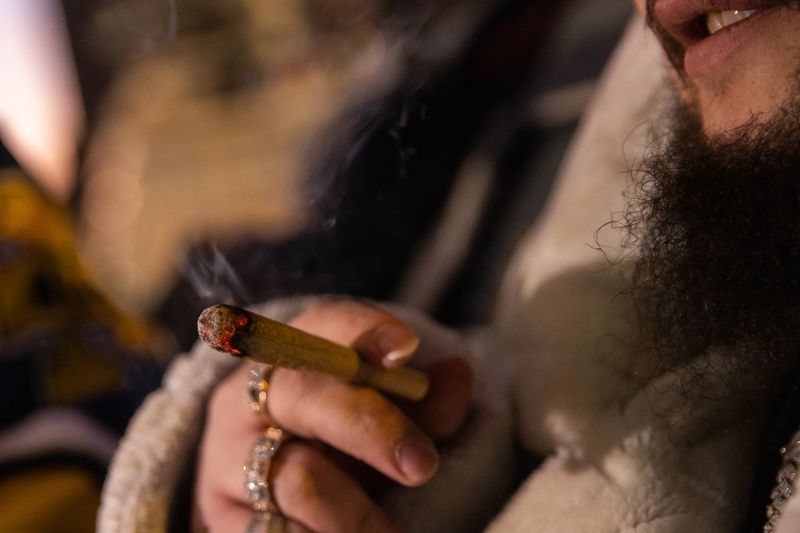The next Spice?
A new generation of synthetic drugs made from hemp is undercutting the legal cannabis market — and raising concerns about contaminants and side effects including seizures and lung injury.
The new drugs, with names such as Delta-8, HHC and THC-O, offer a psychoactive hit similar to that of traditional marijuana, whose main ingredient is known as Delta-9 THC. Because they can be made cheaply with hemp — which, unlike marijuana, is federally legal in the US — the drugs exist in a regulatory loophole. That has tempted some companies to try selling them untaxed and unregulated, even in states where marijuana isn’t legal. They’re succeeding, selling almost $2 billion of the products over the last two years, according to new research from cannabis data firm Brightfield Group.
Their success comes at a tough financial time for cannabis, as small players are failing due to competition from the black market, which can sell cheaper products that aren’t taxed or regulated. The new breed of synthetic drugs is adding even more competitive pressure — and even tempting some beleaguered participants to take up selling the hemp derivatives themselves, despite a lack of safety testing.
“These are really high-potency products that are being sold in every corner store and gas station,” said Tiffany Devitt, chief of regulatory affairs for Groundwork, a California-based holding company for cannabis producers. She’s also the author of a recent white paper on the phenomenon. “These sorts of intoxicating hemp products make a mockery of the regulated industry, they render it meaningless,” she said.
State regulators have tried and failed to quash the market, which took off with the explosion of Delta-8 products around two years ago. Testing commissioned by Bloomberg News in 2021 to investigate reports that reagents like battery acid and pool chemicals were leaving contaminants in Delta-8 found heavy metals, as did another study by the US Cannabis Council, a marijuana-industry trade group.
Since then, more than a dozen states have banned Delta-8 and other hemp-derived psychoactive substances.
Some companies have supported the market, however. Even popular brands that sell licensed cannabis have begun selling the hemp-derived synthetic drugs. This includes Cookies, one of the best-known US brands. Co-created by the rapper and entrepreneur Berner, and owned by TerrAscend, Cookies recently opened a flagship store in Manhattan’s Herald Square, across from Macy’s. The company’s website advertises Delta-8 and HHC products as a “fully psychoactive” and “federally legal” items it can ship straight to customers.
Cookies declined to comment in response to questions about its rationale for selling the synthetic drugs or the safety of the products.
The most popular hemp-derived drug is Delta-8, which makes up about half of the $2 billion in sales, according to Brightfield. Synthetic hemp-derived Delta-9 is about 13% of the market, HHC is 12%, Delta-10 is 8% and THC-O is 8%, according to a spokeswoman for the research firm.
Brightfield noted that competition isn’t just affecting licensed cannabis, but also CBD products. It estimates that 30% of cannabis users and 35% of cannabis users have tried a psychoactive hemp product.
Some of these compounds, such as Delta-9 and Delta-10, exist naturally in the cannabis plant, while others are novel compounds, making them more akin to synthetic drugs such as K2 and Spice that have existed since 2008. Both of those drugs can cause seizures and death, according to the US Centers for Disease Control and Prevention.
Many of the new generation of synthetic cannabis products are made with solvents, and tweak molecules to add extra hydrogen or carbon atoms. Other compounds include THC-P and THCjd, which Devitt’s white paper describes as having more carbon atoms and strengths much higher than regular THC.
Studies are ongoing into their health impact. Devitt noted that because they bind more strongly than regular THC to cannabinoid receptors in the brain, more intense experiences and side effects are likely. A recent study in the Journal of Medical Toxicology said vaping THC-O has the potential to create an epidemic similar to EVALI, or vaping-associated lung injury, which was first recognized in 2019. EVALI has led to thousands of hospitalizations and killed dozens. THC-O bears a structural similarity to Vitamin-E acetate, the additive that was fingered for the EVALI outbreak, according a recent press release from Cal NORML, a nonprofit that advocates for legal cannabis.
One company that sells THC-O is Steve’s Hemp, based in Eau Claire, Wisconsin, which lists potential side effects as vomiting and seizures. The company didn’t respond to an email seeking comment.
Consumers haven’t been scared off — rather they’ve been lured by availability and prices that can be much lower than licensed marijuana. Brightfield’s data shows that in legal states, 23% of cannabis users say they’re likely to buy Delta-8 products in the future.
But a “regulatory tipping point” may be looming, Brightfield cautioned; the farm bill that legalized hemp in 2018 is being renegotiated this year in Congress, potentially closing up the loophole that makers of the synthetic drugs have exploited. As the report put it, “the legality of Delta-8 and its siblings is on very shaky ground.”
H/T: www.bloomberg.com




